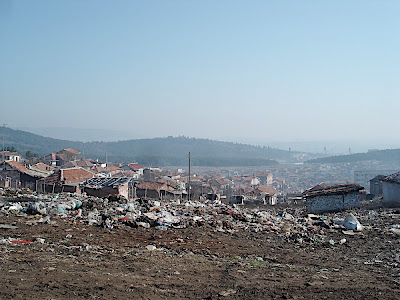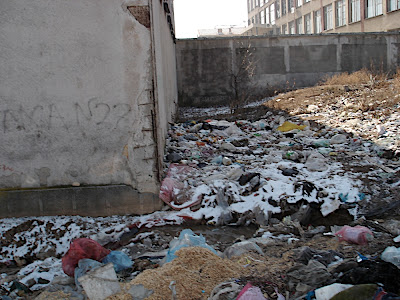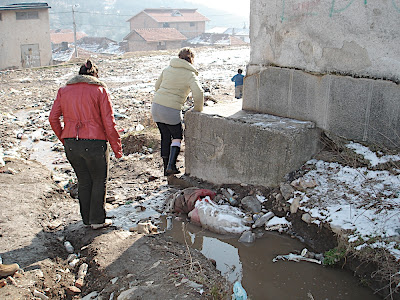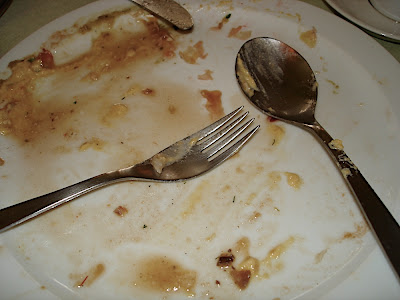
I have been amazed at the contrasts that I have seen. I am a Peace Corps volunteer in Bulgaria, but also in the European Union, which is to say that I see two very different places existing in almost the same place. Bulgaria in a country of roughly 9 million people, give or take for immigration to richer western European countries. Out of 9 million, roughly 800,000 of these people are “Roma,” which means that they belong to one of several different sub-groups of European “gypsies.” As a general rule, these two populations, Roma and Bulgarian, live in two worlds. One is for Bulgarians, and it is an incredibly dynamic place that tries its best to integrate into the new Europe. It is not without its own problems: unemployment is high, inflation is up, corruption and organized crime are real, and most able young people prefer to move than to stay. Bulgarian Bulgaria knows that it exists in this in-between place, between two continents, between a thousand cultures, and between a recent past and a future that seems to move faster than they can hold on. Roma Bulgaria is decidedly different. Many Roma live in their own neighborhoods called Mahalas. Some Mahalas are incredibly nice and look exactly like Bulgarian Bulgaria. However, most do not. In the worst Mahalas, roads serve as sewers, children are married at 12, and people live in houses made of trash. When the roads become complete sewers, the only vehicle that can maneuver them is a donkey cart, effectively ensuring that the police and their police cars hold no jurisdiction. When you walk the imaginary line between the two places, you walk between worlds. This past weekend I visited both places. I went to the city of Stara Zagora to visit my friend at her work. She works in the Mahala, in which over 27,000 people live. Here are some pictures:





The last picture is of a school outside of the Mahala, just for contrast. The are pictures of the school yard for the Roma kids. Please note the river of muck that flows through the playground.
After we left the Mahala, we traveled by train to the fabulous city of Plovdiv to celebrate the birthdays of two of my friends. We rented a room in a hostel and went out on the town for two nights, staying up well past 5 am each night. This contrast was really hard for me to take. The issue of equity, for me, now moves beyond fault and into responsibility. One little boy in the Mahala ran up to me and in his impeccable Bulgarian accent yelled “xhello!” When he turned back towards his friends I saw that his ear was covered in gummed up blood that had yet to scab over. The issue here is responsibility, because I have the option to take responsibility. And the realization: my life is different than this little boy not because of any choice I made, or that my parents made, or that his parents made. My life is different because I was born in San Diego County and he was born here….in the mud and excrement of a world that we are really good at forgetting. I don’t know what to do.
My direct bus home from Plovdiv left at 7:30 in the morning, which was exactly 30 minutes after I went to bed. Instead, I woke at 10, and hoped a bus to Sofia, the capital where there were many direct busses to Razgrad. I had a bit of a layover, so I found my way to the fabled vegetarian restaurant, the Dream House, and had the most amazing buffet ever. I say had, because I prolly ate the whole thing….I don’t quite remember, I was tired.


Peace and Blessings.



4 comments:
I learn so many things and feel so many emotions as I read your blog. I love that you are helping me to learn about this place that you are slowly discovering. I loved what you had to say about responsibility and about forgetting their world. You are right and it's very sad to see people around me caring more about their appearance and material possessions than about the things that matter the most. I applaud you for your efforts and I look forward to reading more. Love you.
How do you remember all these things about our childhood? It ceases to amaze me. We are going to have to sit down one day and have you tell me all your stories. Then we're going to have to write each one down on paper. Oh and after that- maybe I'll "organize" your living quarters.
The first impression is usually the truest. Those guys live in dirt, marry (trade) their children @ age 12 and below. They prefer to steal rather than work. They live in dirt - have you ever been to a gypsey home... yeah you get the idea. They steal electricity and then the el. company makes the Bulgarian part of the population pay for it. They cash in on child support payment and unemployment benefits. Actually, I am yet to see a working (and not stealing or doing other criminal activity) gypsey.
Those are all facts and I believe change will be difficult to achieve. But what I think is that the first and most important step is to make sure the laws are enforced for EVERYONE holding a Bulgarian passport. You steal - you go to jail. You do it again - longer term. You start work, raise your family, pay your taxes - OK! You are entitled to a better life. Without those guys (nearly 99% of all gypseys in Bulgaria) realizing they have to live according to the laws in Bulgaria, they deserve nothing. Not even compassion. Least of all compassion. Trust me, and maybe don't take it on my word, just visit some of the villages in Bulgaria where old people are robbed and beaten by gypsey gangs. I know a few such _confirmed_ stories where the perpetrators were let go simply because they were "protected minority". Hell, There ain't no such thing as protected minority - we're all citizens of this country and we have to keep the rules (laws), which by the way, are quite (way too) democratic (read lenient) at the moment.
Post a Comment